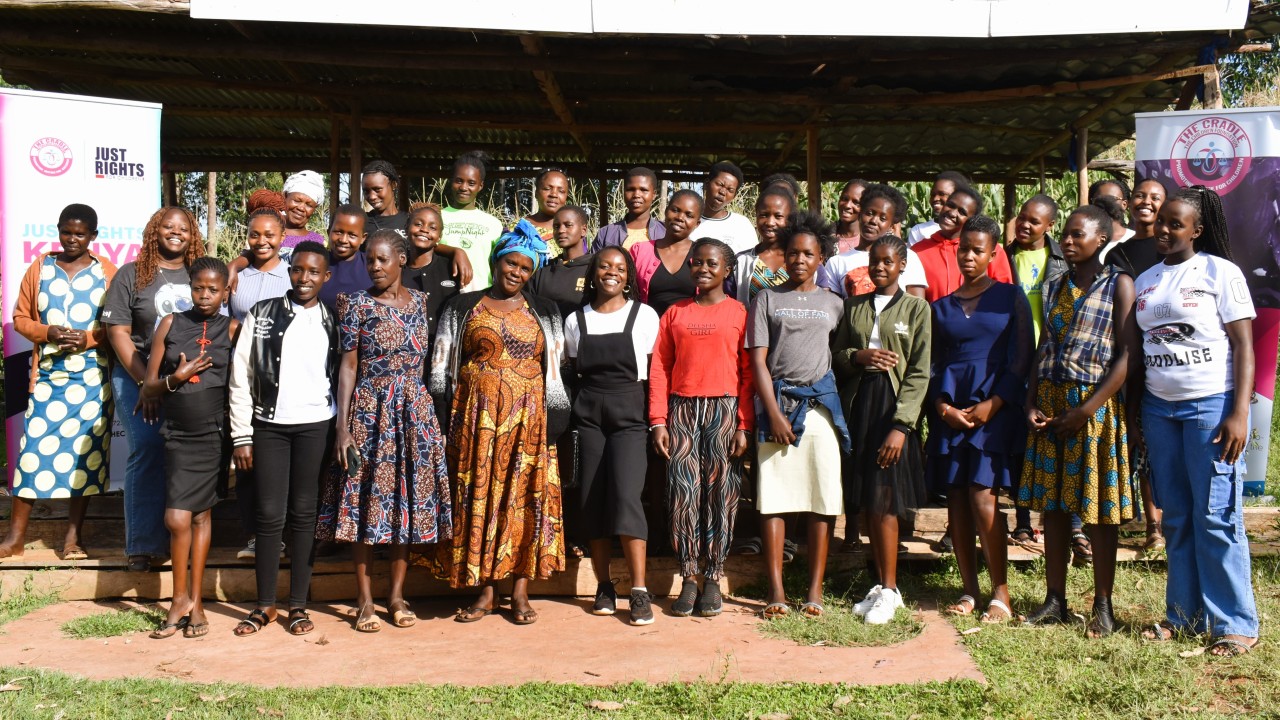Girl-centred legal empowerment to end violence against girls for girls living in rural communities.
Msichana Kuria
Jul 25, 2025
5 Minutes Read

Share with friends
In this blog, we explore how, through a partnership with The CRADLE, we implemented a girl-centred legal empowerment training for girls and women living in Kuria, a rural, cross-border region in southwestern Kenya where different forms of violence like child marriage and Female Genital Mutilation are still very prevalent. We reflect on how this approach works, what makes it effective in preventing and responding to violence against girls. We argue that a girl-centred approach to legal empowerment ensures that girls are not merely informed of their rights; they cultivate the agency to claim, defend, and expand them in dialogue with their communities.

A girl leading a workshop session during the legal empowerment training
In June 2025, we convened a two-day legal empowerment training that brought together 35 adolescent girls and women living in rural & last-mile communities. To build their capacity to engage with the law as grassroots paralegals, to prevent and respond to violence against girls with legal literacy. These paralegals are now emerging as trusted first responders within their village, supporting survivors, navigating referral systems, and challenging harmful norms.
Rooted in over a decade of our experience in girl-led leadership and advocacy in these communities, we shaped the training through a co-creation process with adolescent girls and women. This ensured that the training centred on girls’ lived realities, cultural contexts, and collective aspirations as key building blocks to defining the legal solutions. As a result, we saw that:
Girls saw themselves in the law.
One of the most powerful lessons from this training was the importance of language and narrative. We know from experience that legal frameworks can often feel abstract or inaccessible, especially for girls living in rural & last-mile settings. The girl-centred approach bridges this gap to ensure girls can see themselves in the law. We used real case examples, storytelling, and relatable scenarios, and explored how the law shows up in everyday life, from the cutting of girls disguised as “cultural celebrations” to silent suffering in cases of abuse. And in doing so, the law became something tangible, not theoretical, a tool for protection, for accountability, and most importantly, for change.

A facilitator from The CRADLE leading a session during the legal empowerment training
2. Agency, care, and collective action
The girl-centred approach to legal empowerment makes it not only about knowledge but about cultivating agency; the ability of girls and women to act, speak, and lead in the face of injustice. During the training, we explored different pathways of legal care and support available within their communities, national and international contexts. We discussed how to identify different forms of violence, support the documentation of evidence, and report cases through appropriate legal and protection channels. We also explored how to link survivors to health services, psychosocial support, and safe spaces. Importantly, we acknowledged that these steps are rarely linear; sometimes, a girl may need care before she can report; other times, she may speak out but lack immediate access to services.
3. Opportunity for sustained change
The girl-centred approach created space for girls to imagine and define what lasting change looks like for them and their own communities. Rather than offering a rigid checklist of legal steps, we supported girls to map out practical, context-specific strategies for prevention and response ones they could lead and sustain. For some, this meant identifying trusted adults who could help girls at risk; for others, it was the utilisation of safe spaces within their communities. Some girls spoke of the need to involve caregivers in awareness efforts, while others discussed advocating for better services from duty-bearers.

A facilitator from Msichana Empowerment Kuria leading a session during the legal empowerment training
4. From Training to Movement-Building
Perhaps the most powerful outcome of the training was the sense of collective identity and shared responsibility it sparked. Girls and women who had never spoken publicly about violence were now supporting each other, strategising together, and have made plans to lead in engaging local leaders. We also see this as a critical component of girl-led advocacy as it enhances their advocacy by providing girls with the tools to understand, navigate, and transform systems that have historically excluded them.
Beyond this training, Msichana Empowerment Kuria will continue to support this growing movement of girls and women grassroots paralegals through peer learning, mentorship, and accompaniment. Working alongside them to document their impact, refine their strategies, and amplify their voices at local and national levels to prevent and respond to different forms of violence against girls.
Our argument
This work affirms our belief that legal empowerment is most impactful when it is rooted in girl-centred principles co-created, contextual, and sustained by community trust. We have seen that a girl-centred approach does not simply inform girls of their rights; it enables them to exercise agency, define change, and lead others toward justice. It strengthens care systems, builds collective accountability, and transforms the law into a living, breathing resource that girls can access and shape.
We look forward to continuing to share these lessons as part of Msichana Empowerment Kuria’s ongoing work to prevent violence against girls.
This training was made possible through a partnership with The CRADLE, which has for over 20 years worked to defend child rights in Kenya with a focus on child protection and child justice.



